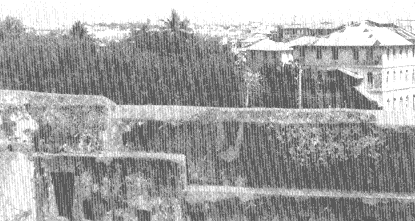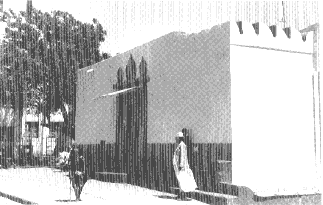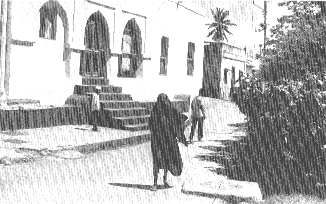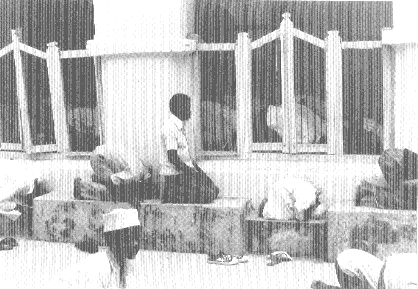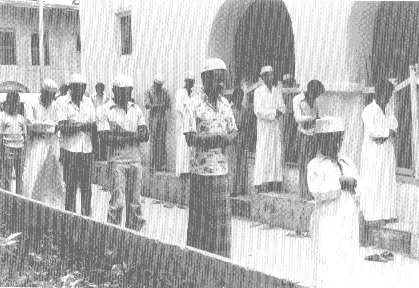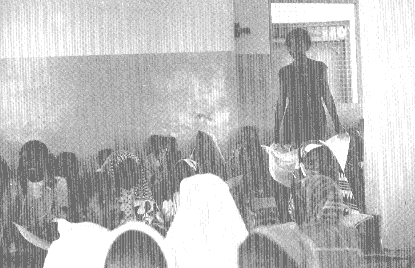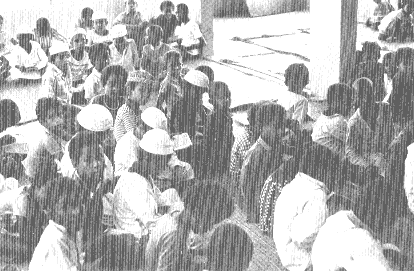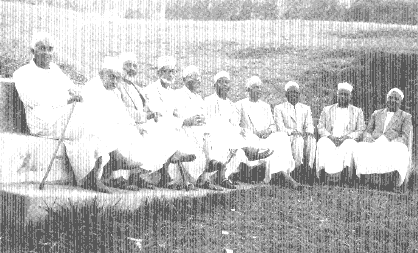Status Differences and Privacy
The fact that sanctioners differ at least sometimes in their judgments helps explain the emphasis on privacy and secrecy found here. If no one knows about an actor's behavior, he has no realistic cause to be concerned about aibu (although he may be concerned anyway), but such secrecy is difficult or impossible in a small, mainly endogamous community of around 2,000 whose members live together in closely packed neighborhoods in a single section, Old Town, of the island of Mombasa whose whole area is only three miles by five miles (DeBlij 1968).
Moreover, some potential aibu, like the shoeless father's brother referred
to earlier, are based in things that occur in public and cannot by their very nature be kept secret. Here actors cannot confidently use secrecy as the sole basis for attempting to avoid aibu once an act known to be taken by some as shameful has been committed or, in some cases, contemplated. What the actor can do is to lessen the likelihood that news of the act will circulate. Frequently, particular attention is given to keeping this news from those likeliest to judge the act unfavorably.
The distribution of culture in this group includes quite sharp differences among statuses in the expectations used in judgments. As we saw in the case of the sisters-in-law and also for those with secret wives, what is aibu for one group of sanctioners can be a source of honor and prestige for another. Complete secrecy, then, would prevent the actor from gaining prestige at the same time it protected him from aibu. This would seem to call for a strategy of careful information control, and that is, in fact, what we see.
It appears that Swahili women commonly are freer and more open in their relations with others, including being willing to discuss more of their own and others' personal affairs. This may be in some part related to the view, held by both men and women, that men are more preoccupied with avoiding aibu than women are. Given men's greater concern with aibu, it could be that men are more willing to forgo honor from a limited group of sanctioners than to risk aibu as seen by a much wider section of the community, while women more often take the opposite strategy.
Whatever differences there may be between men and women in their approaches to aibu and to honor, there can be no doubt that there are differences among sanctioners in their evaluations of others' behavior. These differences are often known to actors and, at least sometimes, used in calculating how to act and what information to allow to pass to whom.
Such calculations must take into account that judgments depend not only on the statuses of the sanctioners but also on the statuses of the judged and the act at issue. Thus, to consider only one of these dimensions, nuclear family members are less likely than outsiders to judge one another harshly as concerns such potentially aibu sorts of activity as eating low-prestige food or employing generally disapproved means to gain advancement in employment or shcool. The same family members, however, can be very severe judges as concerns use of family property, meeting of family obligations, and public displays of unseemly behavior.
Similarly, regardless of the activity being judged, rivals for something are likely to make consistently less favorable judgments of one another than those working together to get it. Generally, it is the specific role, the part of a status's collection of understandings concerned with relations with another in his status, that affects judgment. A son judging a mother proceeds on quite different grounds from another mother judging that mother, so that evaluations of performance in the mother status coming from the mother-son role
View of Old Town, Mombasa.
Two of the Mosques in the Old Town.
Young men praying outside the Basheikh Mosque in Old Town, Mombasa.
Older men are inside where no photographs were allowed.
Girls in religious school (chuo ).
Boys in separate religious school.
Ten important members of the Swahili community, mainly of the contested
ethnicity that forms the basis for chapter 3; these are called "Swahili Arabs."
Men leaving meeting of the Muslim Association; many are not Swahili
since the association includes all Mombasa Muslims. The man in the suit
(foreground ) is the provincial commissioner.
are based in expectations different from judgments in the mother-mother role. Statuses provide the understandings used in judgment. More particularly, evaluations are based in the expectations within the status that governs the relationship with the judged in the status relevant for the purposes of the judgment.
The roles occupied by sanctioners vis-à-vis those they judge affect not only the nature of the judgments they make but also which particular acts they will know about. So, for example, men are far likelier to judge the actions of their male peers in a variety of kinds of activities than they are to judge women of the same age and social standing for comparable activities and vice versa. Members of each of these status groups do judge members of the other as concerns some things such as propriety in sexual seclusion and marital fidelity, but they do not judge members of the other group on some behaviors that are quite important within that group.
Thus, men judge women's clothing and jewelry very little—they have little opportunity to know what unrelated women are wearing since women appear in public only when completely covered by the all-enveloping black buibui—although women use this as a major basis for judging one another. Women judge men very little on how the men follow etiquette, in considerable part because they see little of the relevant behavior since most public expressions of etiquette occur mainly in contexts where the sexes are separate. Men, especially those of the well-to-do sections of the community, judge each other quite closely in this domain. The judgments individuals make vary according to the characters of the individuals and of the relationship with the judged, but this variation is within limits imposed by statuses both as concerns what is judged and the basic criteria for judgment.
Sanctioners, then, differ in a number of ways, including the standards they use for judgment, how they apply these to different sorts of others, and the likelihood that they will make judgments on various kinds of behavior as carried out by people of different types. All of the differences among sanctioners, even the bases for individual variation, stem from the differential distribution of culture, which, as shown earlier, is a feature of the social structure with its differentiated and connected statuses.
In Swahili society, differences between men's and women's understandings about what is aibu and what produces honor, despite some important areas of agreement, are still great enough that men say that women care little about aibu. Wikans (1984:635–652) notes that in many studies of societies where honor is stressed, it appears that women have no honor of their own—or shame either—but only affect the honor of their husbands and male kin.
Such a view would result, of course, from the distribution of culture, leading researchers who work mainly with members of one sex to fail to know about the standards held by members of the other sex if, as is true for Swahili society and for the ones Wikans refers to, gender is used as the basis for
differentiation involving importantly different understandings in the resultant statuses.
Differences between statuses are not limited to the type seen between men and women where members of one category are, or profess to be, ignorant of understandings important to members of the other category. There are also important differences in understandings about to whom and in what circumstances particular standards should be applied. Thus, the members of a particular family were fully aware of the understandings to be used in judging a person who engaged in a business dependent on the sale of alcohol (abhorrent in this pious Muslim group), and they would surely use these standards in judging an outsider, but the family members definitely did not use them in judging their husband-father who had grown prosperous through the sale of fermented palm toddy.
There is still another source of difference in assessing aibu which arises from the distribution of culture. This one results from the fact that everyone occupies a number of different statuses, each of which includes understandings, often different from status to status, about what constitutes proper and acceptable behavior by others depending on the statuses occupied by those others. Because of this, even actors who share many of the same statuses may, on the basis of their relationship to the judged person, use understandings from different ones of those statuses as the foundation of the judgment they make. This choice is not an entirely individual one but depends in part upon culture, specifically, on the type of status-associated understandings that I have called "salience understandings."
For example, some may judge what a fellow group member does according to understandings associated with the status "community member" while others may judge the same person according to the slightly—or grossly—different understandings associated with the statuses "neighbor," "friend," or "enemy." Which will be used depends upon the status the judge assigns himself and this is guided by salience understandings. A number of considerations affect these last including to whom judgment is expressed, but the nature of the relationship between the judge and the judged is often also important. Since the judgments made depend upon the status whose understandings are their base, saliency understandings play quite an important part in the operation of judgment just as they do in the operation of statuses generally.
Although everyone is a sanctioner as regards some acts, it is by no means true that everyone is, or ever will be, an arbiter. This is a status assigned to only a few members of the group who meet very demanding standards. As seen above, the judgments of different sanctioners of the same activity and individual often differ. Also different sanctioners, as such, are concerned with different categories of people, so that even when knowledge of some activity is widespread some kinds of sanctioners may not pass judgment concerning it.
None of this is so for arbiters. Within the rather narrow scope of public acts arbiters are understood to notice, judgment is taken as independent of any of the statuses of the person who commits the act. If an arbiter were to judge an act by someone differently from their judgment of another, his standing as an arbiter would thereby be put in question.
The arbiters are accorded great prestige mainly deriving from the understanding that members of this status set very high standards for themselves and live up to those standards. They are all men of middle age or older who can easily be recognized by the spotless traditional clothing they wear whenever their occupations make that costume possible. They are also distinguished by their erect posture, measured gait, modulated voices, and judicious manner. They follow the elaborate etiquette derived mainly from Persian Gulf Arabs, almost every one of them has visited Mecca during the pilgrimage season at least once, and they all have standard places at the front of the mosques where they customarily pray.
These men have a special presence that is obvious even to outsiders. It is, I am told, the men I call arbiters whom people have especially in mind when they say in praise of a young man or boy that he "fears the faces of the 'nobles.'" When young men lower their voices, improve their postures, and look at the ground, the man passing is surely an arbiter.
As the praise for youths suggests and as informants agree, the men I am referring to as "arbiters" are taken by group members as representing what is most honorable and worthy of respect in the community. These arbiters have no special designation. "Arbiter" is a name being used for analysis. Nor do they have a title; they are addressed as "sheikh," as are all mature males in the group.
Despite their importance in evaluation, they do not intercede in the affairs of other people to make explicit judgment. If anything, they are less likely to comment on the behavior of other group members than lesser people are. This is a consequence, informants agree, of their following the ideal that "nobles" do not gossip or discuss the actions of others. What is distinctive of them, and this is something that informants say about them and that they say about themselves, is that they "frighten" (tisha ) their fellow group members.
What "frighten" means in this context is that people are sharply constrained in their behavior when they view that behavior as being considered by the arbiters. Even those given to making cynical and belittling remarks about the arbiters in private, and these are mainly disaffected youths and people whose group membership is marginal, are nevertheless distinctly restrained in their presence—even if they are across the street—and seem concerned about their opinions even as they declare their indifference to them.
There is an illness called mata ya wazima , the eyes of the grown people,[4] that afflicts youths and is believed to be caused by the young people behaving
improperly in their presence. The "wazima" are all the mature men of the community, but informants agree that it is the high-prestige men of the kind I am calling arbiters who are particularly dangerous to youths who misbehave. The danger does not come from the men doing anything active when the youths misbehave. Disease is the direct result, I am told, of the impropriety being committed in front of the mature men, who do not actively participate to bring it about.[5]
The standing of mature men and, especially, the arbiters who embody the essence of their qualities is clearly an important aspect of cultural conformity here. Two anecdotes will illustrate how the members of this status group are viewed in the community and help explain that view.
A Swahili man living in a small city to the north of Mombasa noticed that corn was disappearing from a field he owned, and he resolved to spend the night in his field in the hope of catching the thief. After it became quite dark, he saw a figure enter his field and begin to pick his corn. The owner crept near where the thief was at work and on seeing the man's face recognized him as one of the town's leading citizens. On discovering this, he silently turned and fled. He told no one of his discovery until years after the event.
The second anecdote concerns a highly respected member of the Mombasa Swahili community and me. I had been hurt in an accident while traveling to Mombasa, and I could not leave my room at the Mombasa Club because my injury made it nearly impossible for me to walk. The respected man, a friend and patron of some years standing, lived only about a hundred yards away from the club and had heard, I was told by visitors less prestigious than he, that I could not walk. At first, he sent one of his sons to ask how long it would be before I could go to his house. I sent back the message that it might be several weeks before I could navigate beyond my room. That night he came to the club to visit me and told me that it was the first time he had ever set foot in the place despite its proximity to his house and his friendship with a number of club members.
I thanked him for visiting me and asked him why he had not been in the club before. He said that he knew the club had a bar (it does) and believed that members of the Swahili community sometimes drank beer or spirits there (I have never seen any). He said that if he had seen community members there drinking in contravention of Islam's prohibition, his "respect would be broken." By that, he explained, he meant that the drinkers would never again "fear" him and would "do whatever they wanted to" in front of him. This, he said, would ruin his reputation.
It was clear to me that only his concern for my welfare had brought him to risk this. Both coming to my room and leaving, he used a staircase that did not take him by the club's bar. This route may have been scouted for him by his son when the latter came to visit me the day before.
